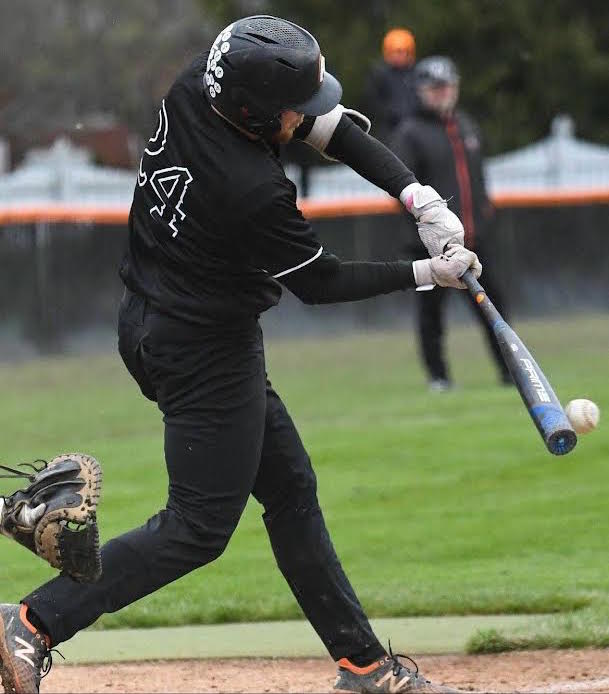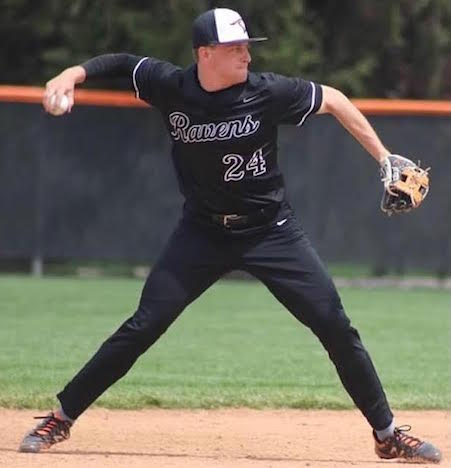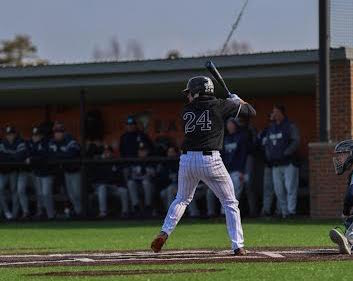
BY STEVE KRAH
Indiana Tech has won its first Wolverine-Hoosier Athletic Conference baseball title since 2019.
The Fort Wayne, Ind.-based Warriors, who swept a best-of-three WHAC championship series from Madonna Monday, May 6, find out today (May 9) where they will land for next week’s NAIA Opening Round. The draw show is scheduled for 4 p.m. Eastern Time.
Fifth-year senior Parker Bates has been key contributor for Indiana Tech (32-22) in 2024.
In 53 games (49 starts), the righty swinger is hitting .300 (54-of-180) with seven home runs, three triples, 10 doubles, 40 runs batted in, 35 runs scored and a .883 OPS (.377 on-base percentage plus .506 slugging average).
“I’m a guy that likes to swing a bat,” says Bates. “I’m not going to say I look for the perfect pitch every single at-bat. My focus is finding the barrel and trying to put the ball in-play hard. Sometimes that gets me in trouble. I’m a guy who likes to swing early because a lot of times the pitcher is coming with a fastball (up in the zone). That’s the one I like to hunt.”
There are times a pitcher knows Bates’ tendencies and he has learned to adjust when they flip an off-speed pitch his way.
Batting in the No. 2 or No. 6 hole based on the match-up and playing a shortstop, third base or left field depending on the team’s need, Bates has 13 multi-hit games with three March 30 at Rochester, May 1 vs. Aquinas and May 2 at Concordia.
Bates has similar keys whether at short, third or in the outfield.
“I want to get a good first-step reaction and good read on the ball,” says Bates, a 6-foot-2, 190-pounder. “Sometimes I get caught flat-footed. But as long as I’m staying loose, fluid and working through things, that’s when I’m playing best defense.
“I try to keep my hands out-front and keep moving and making the plays.”
Bates does much of his offensive work with Indiana Tech assistant Sean Herberger. Brent Alwine coaches Warrior hitters and infielders.
Kip McWilliams is in his 17th season as the program’s head coach.
“He’s an old-school guy,” says Bates of McWilliams. “He’s definitely going to hold you accountable. Nothing’s ever easy around here. If you’re slacking off or not working hard or performing, you’re going to know it. There’s no favorites around here. You have to earn every single bit of playing time, every at-bat, every chance on the mound.”
The Warriors has won 28 of its last 34 after a rough start to the 2024 season.
What makes this Indiana Tech group so sturdy and resilient?
“I think what makes us as tough as we are is what we’ve all been through,” says Bates. “We actually played really good in the fall. I think we lost one or two games. We got our confidence way up. Heading into the winter we were thinking we’re going to be a good team. We got inside and it got tough. Our own pitchers started tearing us (hitters) up.”
Then the spring season started.
“We were dropping games on walk-offs and by one run. It came down to one play sometimes. It was us just sticking together, knowing we are a good team. We started putting some wins together and winning some big games.”
Bates graduated from Indiana Tech with a Mechanical Engineering degree and is a few more classes from finishing a Master’s in Project Management. He just accepted a job in that field with Fleming’s Excavating in Decatur, Ind.
He played for the Indiana Summer Collegiate Baseball League’s Kekiongas in Fort Wayne in 2020 and 2021, did an internship in 2022 and was with the Great Lakes Summer Collegiate Baseball League‘s Grand Lake Mariners (Celina, Ohio) in 2023.
With no more eligibility after 2024, Bates is heading into the last college games.
“This is it,” says Bates, who turns 24 in September. “It’s kind of surreal. It’s pretty bittersweet. I’ve enjoyed my career. I’ve been able to play on some great teams and play with some great guys.
“I got blessed with one extra year. It’s the only good thing that came out of COVID. We’ve been trying to win the WHAC for five years and we finally did it.”
Born in Decatur, Ind., Parker got his baseball start playing around 10 in a Wilshire, Ohio, farm league for uncle Brendan Bates (who is now a softball assistant at Parkway in Rockford, Ohio).
After that came youth ball through Koufax League in Monroe, Ind. Travel ball included a team consisting of Adams, Jay and Wells counties including Grant Besser (who now pitches for Indiana Tech).
Adams Central Middle/High School in Monroe, Bates was a three-sport athlete (football, wrestling and baseball).
His head football coach was Michael Mosser.
“He’s just an awesome guy,” says Bates of the man who has led AC on the gridiron since the 2009 season. “He’s not the kind of guy that’s going to yet and scream at you. He’s going to get the best out of you.”
In football, there was also assistant defensive coordinator Tyler Roach.
“That guy helped me more than I can put into words,” says Bates. “He’s been a fantastic coach and role model in my life!”
Tony Currie led the Jets matmen aka the BAGUBAs (Brutally Aggressive Guys Uninhibited By Adversity).
“I cannot give enough thanks to Tony Currie and the sport of wrestling,” says Bates, who helped the Jets to an Indiana High School Wrestling Coaches Association State Duals title and lost three times in the “ticket round” at the Fort Wayne Semi-State as an individual. “I don’t think I’d be the athlete or the competitor that I am without having wrestled. I love baseball, but wrestling in the hardest sport there is. If you can wrestle and be successful, there’s nothing you can’t do.
“Tony was a guy that was always helping me out and encouraging me. He was making me a better athlete and competitor. He’s a guy I very highly look up to.”
Dave Neuenschwander was head baseball coach.
“He and I would butt heads sometimes, but it was because we were both such tough competitors,” says Bates of Neunschwander. “He wanted to win.”
Bates roots for the New York Yankees. His all-time favorite player is Hall of Famer Derek Jeter.
Among actives it’s Yankees outfielder Juan Soto.
“I just love the way that he swings the bat,” says Bates. “That dude’s just a hitter through and through.”
Bates took some cues from Soto while struggling last summer and has carried it forward.
“He gets so wide and low and is so quick through the zone,” says Bates of the lefty-swinging Dominican. “I widened out my stance and shortened up to be able to do little more at the plate this year.”
Harness racing driver/trainer Brandon Bates is Parker’s father and Berne, Ind.-based nurse practitioner Alicia Bates is his mother.
Brother Hunter Bates (Adams Central Class of 2016) played the same three sports in high school as his younger brother then a little football and was a national qualifier in wrestling at Wabash College. He now works at a hospital in Fishers, Ind.
Half sister Halle Bougher is a teacher in Convoy, Ohio.



































